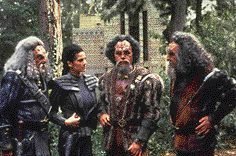tlhIngan
Qummem ’et
The
following is based on an article by Alex Greene that appeared the Official UK
ST Fan Club Magazine. I was so inspired to learn tlhIngan Hol (I already had a Dictionary) that my
search for other interested parties led me to starting tlhIngan
Qummem. Some of the
credit must therefore go to Alex. Please read on and ignore any comments that
are obviously aimed at the reader who hasn’t made the decision to take that
next step. Qapla !!

HIghoS
. yIlaDlI’qa’
The
opening line of a conversation by a non-fan to a typical Trekker used to be,
"So you’re a Trekkie, then?" It used to stand alone, or was followed
by some inane comment along the lines of, "beam me up scotty!"- but
then the matter was laid to rest. Sometimes, you’d get aVulcan salute thrown in
as well, for good measure .....but that was all.
Nowadays,
however, the typical ordinary fan of Star Trek is also likely to be asked the
question "So, do you speak this Klingon language then?" or, worse,
"Go on, then - say something in Klingon." There’s no rest any more....
Many
Star Trek fans would be satisfied simply to say something like "I’m
a fan, but I wouldn’t say that I was that sad," or "I’m sorry I don’t
have my Klingon Dictionary with me." These two excuses are usually
sufficient, provided the fan immediately follows it up with a swift bit of
subject- changing, such as suddenly talking about the weather or the appalling
state of traffic conditions.
This
Directory is for those fans who have no such excuse. If you’re reading this,
and you keep your Klingon Dictionary close by you, even in public, this
Directory is for you.
There
are those with the burning ambition to be among the first people on Earth to
learn an alien language. This is not as sad as it might initially sound. To
learn to communicate in an alien’s language is to take the first steps to
over-coming your prejudices against that alien, which is after all what Gene
Roddenberry had been telling us all along.
First Steps
So,
assuming you want to learn Klingon, here’s a few things you can try...…
1.
Buy the Dictionary.
|
|
This is not as daft as it might sound. Many are the students who have started to learn Klingon by means of the tapes alone, or have attended language classes (of which more later) without bringing along copies of the Klingon Dictionary with them.Get the book. Read it. Use it. It contains everything you’ll need to learn to use Klingon to its fullest. |
2.
Paraphernalia.
|
This
includes the tapes, poster etc. You’ll need the tapes to hear Marc Okrand,
the inventor of Klingon, pronounce the sounds of Klingon. That’ll give you an
idea of how to say it. Admittedly, there isn’t a lot of source material featuring spoken Klingon dialogue. Watch the Star Trek movies, notably III, V and VI, and the Star Trek: The Next Generation episodes, particularly "Sins of the Father" and "Re-demp-tion", among others. |
|
3.
Organise Study and Practice for Yourself.
Set
aside time in the day, and a private place to yourself if you wish, to study.
This isn’t compulsory. You’d be amazed at the variety of places that you can
find where you can learn Klingon undisturbed by the general public. Virtually
every normal daily activity where conversation is not involved can provide
useful opportunities for study: From rush-hour strap-hanging in the tube with a
Walkman on your hip, to doing the laundry while listening to Marc Okrand on the
stereo.
If
you study in public, most people may think you’re learning to speak Arabic or
something, especially if you’re learning how to speak Klingon from the tapes.
Just don’t let the public see what the tapes are.....
4.
Keep Notes
It
doesn’t matter how you do this. Use flashcards, if you wish. Tape Post-It notes
about the house. Buy a little notebook, preferably an indexed booklet such as a
telephone book, record all the words you’ve learned in it. Buy two so you can
keep one set to translate English - Klingon, and another so you can translate
Klingon - English. I prefer flashcards, but you’ll have your own preferences.
Whatever works for you.
5.
Conversation.
|
|
This
is probably the most difficult stage, not only because you may still only be
practising Klingon pronunciation, and because you may still need to refer
frequently to the Dictionary, but also because other Klingon students are few
and far between. Here’s where you’ll come against the one flaw in your
careful study of Klingon: you’re likely to be studying on your own, with
nobody else to turn to (qe’San: not any more).
|
Stuck Already?
|
At
this stage, you may consider joining an organisation such as the KLI in the
USA, who will teach Klingon. A worthy endeavour, but if you’re
on a tight budget you may not like the thought of subscription fees, etc.
|
|
1.
Penpals.
|
|
Start up a regular postal dialogue with someone you know. It could be a penpal you already know speaks Klingon, or it could be someone you’ve met at a Star Trek convention somewhere. However you come to know that person, write to him or her (qe’San: and tell them about tlhIngan Qummem). |
|
You
needn’t write your letters all in Klingon at first. Start by translating the
greeting and valediction (the ‘Yours sincerely’ part). I prefer to sign off
with the phrase ’tugh qaghItlhqa’ I shall write you
again soon. Other ways
of signing off include maghomchuqqa’ We shall meet again, or something cultural such as bISuvtaHvIS
bIHeghjaj May you die in
battle. Once you’re satisfied with your improved mastery of Klingon, you may wish to write selected passage in Klingon; perhaps whole paragraphs at a time. Only when you’re confident in your friends ability to read Klingon, however should you begin to send him correspondence written in Klingon from beginning to end. Consider it a mark of honour if you can both manage this feat (qe’San: Use the ‘skill level’ as a guide when writing to someone for the first time. Someone of a higher level will not expect a beginner to write at their level so do write to them as well as to other of your own level). |
|
2.
Join a Club.
|
|
Become a member of a Star Trek fan club whom you know will have members who are students of Klingon (qe’San: I originally had problems and couldn’t find one which is why I set up tlhIngan Qummem. However, try the Klingon Language Institute (KLI). The Klingon Strike Force is another great place to start; at least all their members are interested is in the Klingon culture which helps with the language ie. thinking like a Klingon). |
|
|
Initially, whatever club you join, you may be a minority; but if you persist, and people take an example from your lead, you’ll soon end up with people writing to you in Klingon With luck, they’ll have read this article first, so you won’t end up getting huge letters written entirely in Klingon in reply to your first faltering <nuqneH>. |
|
|
3.
Non - KLI Classes
|
These
are few and far between. So far, I have not heard of anyone else setting up
Klingon language classes in the UK. I (Alex) run Klingon language classes at Star
Trek conventions, but then I have an ulterior motive for this - I seek to
raise the overall level of Klingon competency among fans. I’ve studied Klingon more or less alone for eight years. Now its time seems to have come, no beginner should be alone any more; and with over a quarter of a million Dictionaries sold, they shouldn’t have to be. |
4.
When All Else Fails, Bluff.
|
|
||
|
|
||
|
A
heinous crime , I hear you say. What’s the point of bluffing if all your
studies have been geared up towards trying to do it right? Thus
in reply to a non-fan’s faltering "nook-neck," you may want to try
one or more of the following phrases:
|
||
|
nuqneH qaleghneS - What do you want? It is an honour to see you. |
||
|
qavan je - I salute you, too. |
||
|
chomer Hol po’lIj - Your language skill surprises me. |
||
|
pagh vIneH . nuqneH - I don’t want anything. What do you want? |
||
|
vaj Hol DajatlhlaHbej . majQa’ . qaHoy’ - So you can clearly speak Klingon. Very good. I congratulate you. |
||
|
The
list of possible replies is very long, and does not include the proverbial
replies given in the tapes and Dictionary. If you can figure out a few of
your own, you won’t need to ‘bluff.’ You’ll have mastered Klingon with-out
your even realising it.
|
||
Just
one thing; If you encounter someone who is adept at conversational Klingon, the
only way to ‘bluff’ him is to ensure that you’ve learned the language yourself.
But then, that’s why you picked up the Dictionary in the first place isn’t it?
mu’mey
Qav:
Final words
So,
assuming you’ve decided to study Klingon, and you’re now well on you’re way to
becoming a language warrior, what then? Is there a point to learning Klingon?
Perhaps
, beyond the "because it’s there" argument, there is.
Klingon
was originally designed simply to be a killer dialogue generator, and that is
all. However, it seems to have become more than just that.
|
If
Klingon is the official language used by the Klingons, fully authorised as
authentic, then due to its popularity, it has achieved a unique status, since
it is the first non-prop device to have crossed over the barrier of the small
screen and into popular usage. This kind of makes Klingon the first purely ‘fictional phenomenon’ to have crossed directly into the ‘real world’. If nothing else, that’s got to be ‘worth a couple of pages in somebody’s book,’ as Will Riker once put it. So go figure. |
|
Qapla’
-by
Alexander Greene
Now
you’ve got this far you might as well look at rest of tlhIngan
Qummen. Although you'll
need to contact qe'San
first, to get listed, at qeSan@yahoo.com .
You
then can start writing
to all those other Klingon students out there. Remember:
wa’ Dol nIvDaq matay’DI’ maQap
. We
succeed together in a greater whole.
- qe’San be’rawn
(JON BROWN)








